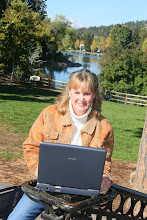Writing about the good times, and the losses, can help maintain that balance. And when writing to process memories, sensory imagery works wonders. When you describe the memory, put yourself back there, almost as though you were hypnotized. What did you see? Smell? Hear, taste, or feel? What did you sense?
For me, Christmas is all about family: both the joys and the losses.

I remember, in my childhood, the sounds of Mitch Miller singing Christmas carols and the jingle of bells everywhere. I remember the smell of fresh-baked cookies as the season progessed and of roast turkey on that special day. No matter which year I think back to, I can see the twinkling lights, the glimmering ornaments, the palette of reds and greens and golds and silvers. I can still feel snowflakes on my tongue when I think about it. I remember the acidic wine that my parents used to pour, only on special holidays.
Those were the good times. As for losses, it's almost the opposite. I hear the silence in our home; I see a naked tree longing to be dressed. I feel the emptiness, sometimes as though I were living in a vacuum. But then the snow flits down from the sky and I run outside, stick out my tongue. It's cold and sticky and wet and tastes exactly as I remember, and that makes me smile.
So now it's your turn. Write down your joyous memories and your painful ones and then explore them with all your senses, and see how you feel when you're done. My guess? A little more in balance, and a little more grateful.


Christmas memories vary for me, depending on my age. But one constant is excitement.
ReplyDeleteWhen I was young, the wrapped presents under the tree were mountains for little toy cowboys and Indians to climb, and there was a magic excitement in anticipation of what will become.
When I had young children, the excitement was in the surprise and hopefully joy that would be expressed as they explored what Santa brought. Getting took a back seat to giving, along with the excitement of getting everything done before the time ran out.
Now it's not quite as fun. It's more about getting it over. It's lost a little magic in the clamour to be perfect. I'm hoping to remember to simplify next year, and magnify what is important -- family and friends (and maybe not eat quite as much either).
Maybe I should catch a snowflake with my tongue.
Yes, the challenge as we age is to still find the magic in the little things in life, whether during the holidays or later in the year. Try this: make a list of the 12 months, and think of one thing each month that might still hold magic for you. A snowflake, a red valentine box of chocolates, a daffodil. And then, as each month arrives, make a point of studying, and appreciating, those things on your list.
ReplyDelete